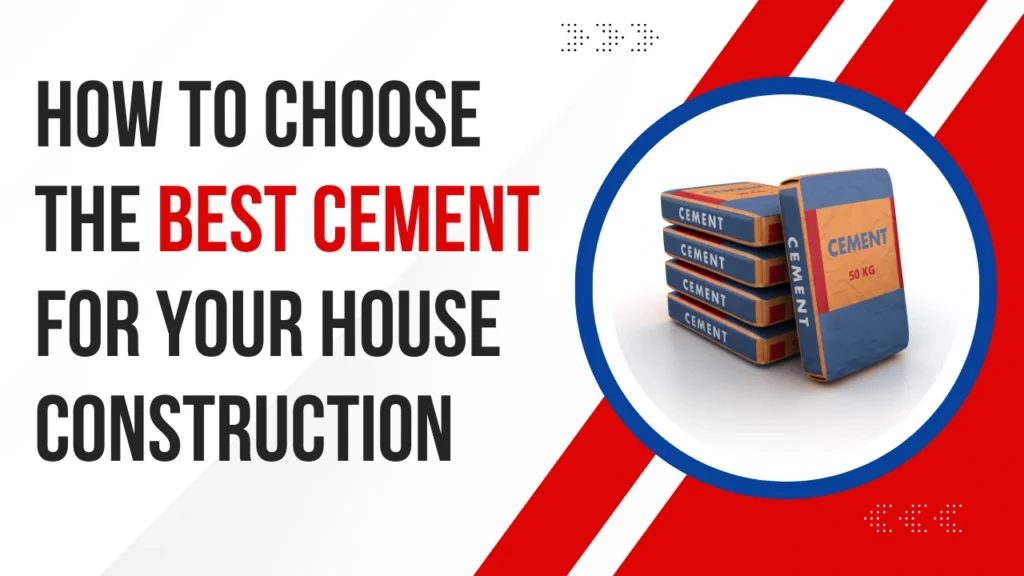
Cement for House Construction: Find the Most Durable Option Today
House construction is an exciting yet challenging journey. Every decision you make, from the design to the materials, impacts the longevity and durability of your house. Choosing the cement for house construction is one of the most critical decisions. Cement acts as the backbone of house construction, ensuring strength and stability. But with so many options available, how do you pick the best one?
This guide will explain the essential factors to consider when selecting cement for house construction, the different cement types, and tips for ensuring you choose the best quality.
Cement for House Construction in Bangalore: Choosing the Right Type for Strength
House construction is a once-in-a-lifetime project for many. To ensure your house stands the test of time, using the right materials is crucial. Cement, the key component in concrete, provides the necessary strength and durability. Selecting the best cement is not just about picking a brand but understanding your construction needs and choosing accordingly.
Why Choosing the Right Cement Matters for House Construction in Bangalore
Cement acts as the binding agent in construction, holding together sand, gravel, and water to form concrete. Using substandard cement can lead to:
- Cracks in walls and foundations
- Reduced load-bearing capacity
- Higher maintenance costs in the long run
- By choosing high-quality cement, you ensure a strong foundation, preventing structural weaknesses and costly repairs.
Types of Cement for House Construction
1. Ordinary Portland Cement (OPC)
- Strength: High compressive strength
- Best for: General construction work, foundations, beams, and pillars
- Grades: OPC 33, OPC 43, and OPC 53 (53 grade is ideal for load-bearing structures)
2. Portland Pozzolana Cement (PPC)
- Strength: Long-term durability
- Best for: Residential buildings, marine structures, and bridges
- Advantages: Higher resistance to chemical attacks and better workability
3. Sulphate Resistant Cement (SRC)
- Strength: Protection against sulfate attacks
- Best for: Coastal areas, sewage systems, and chemical industries
- Advantages: Prevents structural damage in sulfate-rich environments
4. Rapid Hardening Cement
- Strength: Gains strength quickly
- Best for: Urgent construction projects, precast concrete, and repairs
- Advantages: Reduces construction time without compromising durability
5. White Cement
- Strength: Used for aesthetic purposes
- Best for: Decorative and architectural finishes, flooring, and walls
- Advantages: Provides a smooth, clean look for interiors and exteriors
Factors to Consider When Choosing Cement for House Construction in Bangalore
1. Strength and Durability
OPC 53 or PPC are ideal for residential projects.
Higher grades provide better load-bearing capacity.
2. Climate and Weather Conditions
Coastal and high-humidity areas need Sulphate Resistant Cement (SRC).
Areas with extreme temperatures benefit from PPC, which reduces thermal cracks.
3. Brand Reputation and Certification
Opt for brands with ISI certification (India) or equivalent in your country.
Check online reviews and user feedback before purchasing.
4. Price vs. Quality
Cheap cement may compromise quality and lead to higher maintenance costs.
Investing in premium cement ensures long-term durability and savings.
5. Setting Time
Rapid Hardening Cement is ideal for quick construction needs.
PPC and OPC 43-grade cement offer gradual strength development for general use.
How to Identify Good-Quality Cement for house construction
1. Check the Manufacturing Date
Fresh cement (less than 3 months old) provides the best strength.
2. Look for ISI Mark or Equivalent Certification
Certified cement meets national and international quality standards.
3. Check the Texture and Consistency
Good cement should be smooth, fine, and free of lumps.
4. Perform a Float Test for Purity
Drop a pinch of cement in water – high-quality cement sinks immediately.
Best Cement for Different House Construction Needs
- Construction Area
- Recommended Cement Type
- Foundation & Beams
- OPC 53-grade cement for strength
- Plastering & Walls
- PPC for durability and water resistance
- Decorative Finishes
- White cement for aesthetics
- Coastal Areas
- SRC for sulfate resistance
Conclusion
Choosing the right cement is essential to house construction a strong and durable house. By understanding the different types of cement, their applications, and key selection factors, you can make an informed decision. Whether it’s OPC for high strength, PPC for long-term durability, or SRC for coastal protection, selecting the right cement will save you time and money in the long run.
Frequently Asked Questions
Best cement for house constrcution in banaglore
OPC 53-grade cement is ideal for foundations due to its high strength and durability for house construction.
Yes, PPC offers better durability and water resistance, and it minimizes thermal cracks, making it a preferred choice for house construction.
ou can check cement quality using:
Texture Test: Should be smooth and free of lumps.
Float Test: Pure cement will sink in water.
Manufacturing Date: Use within 3 months for best results.
PPC is recommended for plastering as it provides a smoother finish and higher durability.
For optimal performance, cement should be used within 3 months of manufacture. It can last up to 6 months without losing strength if stored properly in a dry place.






